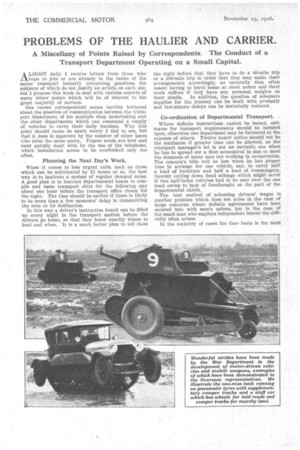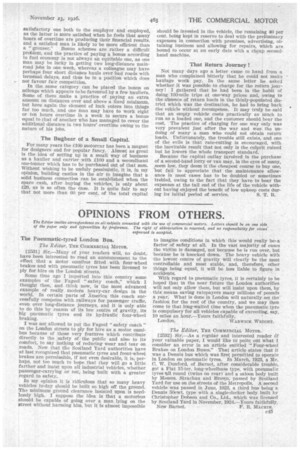PROBLEMS OF THE HAULIER AND CARRIER.
Page 66

Page 67

If you've noticed an error in this article please click here to report it so we can fix it.
A Miscellany of Points Raised by Correspondents. The Conduct of a Transport Department Operating on a Small Capital.
ALMOST daily I receive letters from those who hope to join or are already in the ranks of the motor transport industry concerning questions the subjects of which do not justify an article on each one, but I propose this week to deal with various aspects of many minor points which will be of interest to the great majority of novices.
One recent correspondent seems terribly bothered about the question of communication between the transport department of his multiple shop undertaking and the other departments which can command a supply• of vehicles to carry their daily burdens. Why this point should cause so much worry I fail to see, but that it does is apparent by the number of other users who raise the same query. Urgent needs are best and most quickly dealt with by the use of the telephone, which installation seems to be overlooked only too often.
Planning the Next Day's Work.
When it comes to less urgent calls, such as those which can be anticipated by 12 hours or so, the best way is to institute a system of regular demand notes. A good plan is to instruct departmental heads to compile and issue transport chits for the following day about one hour before the transport office closes for the night. The time should be earlier if there is likely to be more than a few moments' delay in transmitting the note to its destination.
In this way a driver's instruction board can be filled up every night in the transport section before the drivers go home, so that they know exactly where to load and when. It is a much better plan to tell them the night before that they have to do a GO-mile trip or a 200-mile trip in order that they may make their arrangements accordingly, as naturally they often resent having to leave home at short notice and their work suffers if they have any personal weights on their minds. In addition, the question of adequate supplies for the journey can be dealt with promptly and last-minute delays can be materially reduced.
Co-ordination of Departmental Transport.
Where definite instructions cannot be issued, estimates for transport requirements should be insisted upon, otherwise one department may be favoured at the expense of others. Twelve hours' notice should not he the maximum if greater time can be allowed, as the transport manager's lot is not an enviable one when he has to spread out a fleet economical in size to meet the demands of many men not working in co-operation. The concern's bills will be less when he has proper time to arrange for one vehicle, say, to carry half a load of furniture and half a load of ironmongery, thereby cutting down dead mileage which might occur if two half-laden vehicles had to be sent over the one road owing to lack of forethought on the part of the departmental chiefs.
The best method of scheming drivers' wages is another problem which does not arise in the case of large concerns where definite agreements have been entered into with men's unions, but in the case of the small man who employs independent labour the difficulty often arises.
In the majority of cases the time basis is the most satisfactory one both to the employer and employed, as the latter is more satisfied when he feels that many hours of overtime are producing their financial results. and a satisfied man is likely to be more efficient than
"grouser." Bonus schemes are rather a difficult problem, and the practice of paying a bonus according to fuel economy is not always an equitable one, as one man may be lucky in getting two long-distance =inroad jobs in one week, whereas a colleague may have perhaps four short distance hauls over bad roads with terminal delays, and thus be in a position which does not favour fair competition.
In the same category can be placed the bonus on mileage which appears to be favoured by a few hauliers. Some of them make a practice of paying an extra amount on distances over and above a fixed minimum, but here again the element of luck enters into things far too much, and one man may have to work eight or ten hours overtime in a week to secure a bonus equal to that of another who has managed to cover the additional distance in two hours' overtime owing to the nature of his jobs.
The Bugbear of a Small Capital.
For many years the £100 motorcar has been a magnet for designers and for popular fancy. Almost as great is the idea of setting up in a small way of business as a haulier and carrier with £100 and a secondhand one-tonner which has to be purchased out of that sum. Without wishing to be unduly pessimistic, it is, in my opinion, building castles in the air to imagine that a solid business connection can be established when the spare cash, after buying the vehicles, is only about £20, as is so often the case. It is quite fair to say that not more than 60 per cent, of the total capital should be invested in the vehicle, the remaining 40 per cent. being kept in reserve to deal with-the preliminary expenses in connection with premises, advertising, obtaining business and allowing for repairs, which are bound to occur at an early date with a cheap secondhand machine.
That Return Journey !
Not many days ago a letter came to hand from a man who complained bitterly that he could not make haulage work pay. In the same letter he asked whether it was possible to charge for the return journey! I gathered that he had been in the habit of doing 100-mile trips at one-way prices and, owing to the absence of return loads in the thinly-populated district which was the destination, he had to bring back the vehicle without recompense. It may truly besaid that an empty vehicle costs practically as much to run as a loaded one, and the customer should bear the cost. The practice of charging for one way only was very prevalent just after the war and was the undoing of manlr a man who could not obtain return loads. Unfortunately, the trouble still exists, and one of the evils is that rate-cutting is encouraged, with the inevitable result that not only Is the culprit ruined but he lowers the whole transport standard.
Because the capital outlay involved in the purchase of a second-hand lorry or van may, in the eyes of many, seem low, they deem it the cheapest course to buy one, but fail to appreciate that the maintenance allowance in most cases has to be doubled or sometimes trebled, owing to the fact that they have to bear the expenses at the tall end of the life of the vehicle without having enjoyed the benefit of low upkeep costs dur ing its initial period of service. S. T. R.












































































































